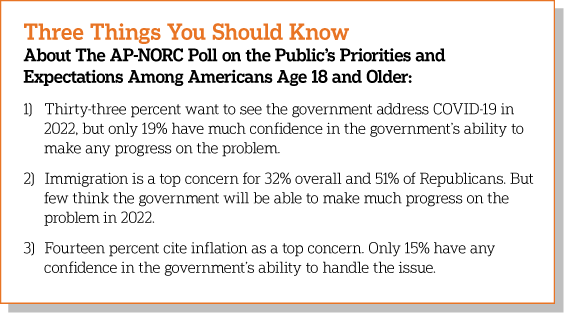
January 10, 2022
As nearly 800,000 Americans died due to the pandemic and the economy experiences a surge of inflation and an employment slowdown, most Americans are pessimistic about the year ahead. COVID-19 continues to top the list of Americans’ priorities for the government to address, but not as overwhelmingly as last year.
To explore the public’s agenda for 2022, The Associated Press-NORC Center for Public Affairs Research conducted a poll in December 2021 in which respondents provided up to five volunteered issues that they believe should be priorities for the federal government in 2022.
Various aspects of the economy remain a major issue for the government to work on in 2022, and inflation specifically has been mentioned for the first time in years. And 24% name pocketbook issues like gas prices as a priority for the government.
Immigration has grown once again as a top priority after slipping last year. Education and climate change remain mid-tier issues. While still named as priorities by some, racism and police brutality have declined since last year.
The survey began a few days after the 28th school shooting of the year, when four students were killed and seven injured at Oxford High in Michigan on November 30, 2021. The poll finds 24% name gun issues as a problem for the government should be handling during 2022.
As always, Republicans and Democrats have different items on their agenda. Democrats are particularly concerned about guns. Forty-one percent of Democrats consider gun issues a top problem, up from 6% in 2020. In 2021, only 6% of Republicans mention gun issues.
Fifty-one percent of Republicans list immigration as one of the top five problems that the government should handle in 2022, up from 24% last year. Foreign policy issues overall went up among Republicans from 42% last year to 64% this year. Among Democrats, 20% cite immigration as a top issue while 30% mentioned foreign policy issues overall.
The nationwide poll was conducted December 2-7, 2021, using the AmeriSpeak Panel®, the probability-based panel of NORC at the University of Chicago. Online and telephone interviews using landlines and cell phones were conducted with 1,089 adults. The margin of sampling error is plus or minus 4.1 percentage points.








